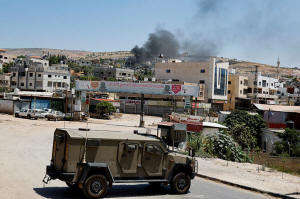Blinken in Middle East to push ceasefire while Israeli troops advance
 Send a link to a friend
Send a link to a friend
 [June 10, 2024]
By Nidal al-Mughrabi and Daphne Psaledakis [June 10, 2024]
By Nidal al-Mughrabi and Daphne Psaledakis
CAIRO (Reuters) - U.S. Secretary of State Antony Blinken visits Egypt
and Israel on Monday hoping to deliver the ceasefire that President Joe
Biden proposed last month, in an all-out push by Washington to secure an
end to the Gaza war.
Ahead of his arrival, both sides doubled down on hardline positions that
have scuppered all previous attempts to end the fighting, while Israel
pressed on with assaults in central and southern Gaza, among the
bloodiest of the war.
"We are committed to total victory," Prime Minister Benjamin Netanyahu
said in a statement released by his office, quoting remarks he made on
Sunday to relatives of Israelis killed in Gaza.
"What is the main dispute? It is over Hamas' demand ... that we commit
to stopping the war without achieving our goals of eliminating Hamas....
I am not prepared to do so. That is clear."
Hamas, for its part, said Washington must push its ally Israel to halt
the fighting.
"We call upon the U.S. administration to put pressure on the occupation
to stop the war on Gaza, and the Hamas movement is ready to deal
positively with any initiative that secures an end to the war," senior
Hamas official Sami Abu Zuhri told Reuters ahead of Blinken's arrival.

The war has now entered its ninth month, since Hamas-led fighters killed
1,200 people and took some 250 others hostage in a rampage through
southern Israel. In response, Israel launched an assault on the Gaza
Strip that has killed more than 37,000 Palestinians and reduced most of
the enclave to wasteland.
Palestinian officials said 40 more bodies arrived in hospitals over the
past 24 hours. Thousands more dead are believed buried under rubble.
ASSAULTS IN RAFAH, NUSSEIRAT
In Rafah, the city on the southern edge of Gaza where Israel launched an
offensive last month in defiance of White House pleas, residents said on
Monday tanks had been trying to thrust deeper towards the north in the
early hours of the morning. They were on the edge of Shaboura, one of
the most densely populated neighborhoods at the heart of the city, a
militant stronghold.
Around half of the Gaza Strip's 2.3 million people had been sheltering
in Rafah before last month's assault, and a million have had to flee
again.
Since last week, Israel has also launched a large-scale assault in the
central Gaza Strip, around the small city of Deir al-Balah, the last
population center yet to be stormed. On Monday, residents said the
Israelis had pulled back from some areas there but were keeping up air
strikes and shelling.
Residents in Nuseirat north of Deir al-Balah were still clearing debris
after Israel freed four hostages in a massive raid there on Saturday.
Palestinian officials say 274 people were killed, making it of the
deadliest assaults of the war. Israeli forces said they were aware of
under 100 Palestinians killed there in intense gunbattles, and did not
know how many were combatants.
"We are exhausted and helpless, enough is enough," said Jehad, who fled
under fire from Saturday's assault in Nusseirat with his family and was
now in Deir al-Balah. The family had already been displaced from Gaza
City to Nusseirat, to Khan Younis, to Rafah and back to Nusseirat before
their latest flight.
[to top of second column]
|

Smoke rises during an Israeli raid in Al-Faraa refugee camp near
Tubas, in the Israeli-occupied West Bank June 10, 2024. REUTERS/Raneen
Sawafta

In video obtained by Reuters from Nusseirat, resident Anas Alyan,
standing outside the ruins of his home, described how Israel
commandos in shorts had appeared in the streets, firing wildly while
F-16s and quadcopters fired from the air.
"Anyone moving in the street was killed - anyone moving, or walking,
was killed immediately," he said. "There are still children under
this building. We don't know how to pull them out," he said,
pointing to one ruin. "Today We found children martyred in that
building," he said, pointing to another.
After months of failed peace efforts, Biden chose a new tack with
his public announcement of his proposal for a ceasefire on May 31,
describing it as an offer that had already been accepted by Israel.
U.S. officials say Biden deliberately unveiled it without asking the
Israelis first, to increase pressure for a deal.
Full details have not been publicly disclosed, but the offer as
described by U.S. officials is similar to texts floated since
January in previous failed peace efforts: a long truce, over several
stages, with gradual release of Israeli hostages ultimately leading
to an end to the war.
What is different this time is that Israeli forces have now stormed
most territory inside the Gaza Strip at least once, and Netanyahu is
under greater domestic political pressure to reach a deal. Fighting
has also escalated sharply in northern Israel along the Lebanese
border, raising the threat of an all-out war between Israel and
Lebanon's Hezbollah group, which is far better armed than Hamas.
Benny Gantz, a popular centrist former military chief, quit Israel's
war cabinet on Sunday over what he described as the failure to
outline a plan for the war's end. That leaves Netanyahu more reliant
on far right allies who say they will bring down his government if
he agrees any deal to end the war without first destroying Hamas.

As in all previous peace attempts, Washington secured Israeli
agreement to the text first, before seeking approval from Hamas
through Egyptian and Qatari mediators. Israeli officials have
acknowledged making the offer but have been lukewarm, with one
Netanyahu aide describing it as "not a good deal".
Hamas says it already agreed to the last Israeli peace offer earlier
in May, only for the Netanyahu government to renege. Israel says the
militants have previously attached unacceptable conditions.
(Reporting by Nidal al-Mughrabi and Daphne Psaledakis in Cairo;
Additional reporting by Dan Williams in Jerusalem; Writing by Nidal
al-Mughrabi and Peter Graff)
[© 2024 Thomson Reuters. All rights reserved.]This material
may not be published, broadcast, rewritten or redistributed.
Thompson Reuters is solely responsible for this content.
 |